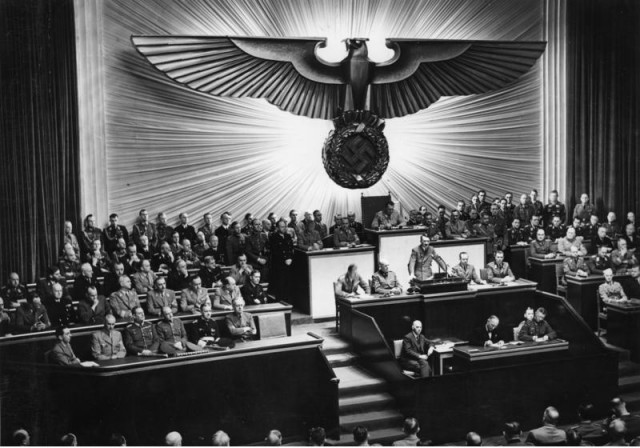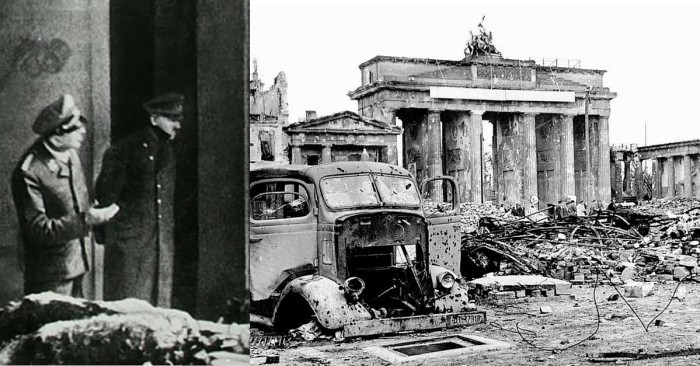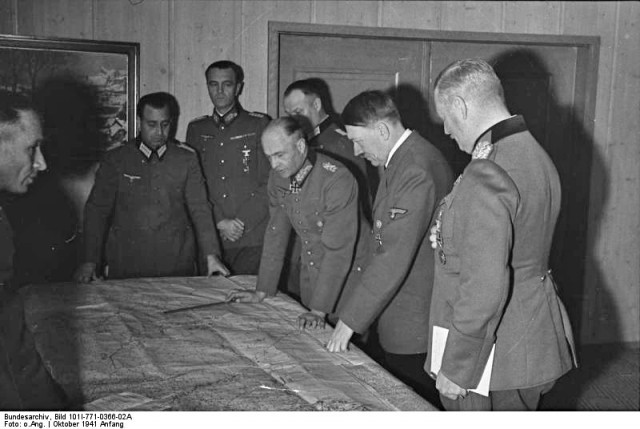Apr 12, 2016
Adolf Hitler, a man who swept the Germans up to incredible victories was also one of the main reasons Germany ultimately lost the war. Refusing to accept reality, taking no advice from anybody and thus making poor decision greatly contributed to a relatively quick end of Nazi Germany.
Here follow 10 reasons why he lost the war.
10. His Allies in the Axis of Evil
On 25 October 1936, an Axis was declared between Italy and Germany. (Bundesarchiv)Having no luck in enticing England to join in a fight against the USSR Hitler had to look for other, less powerful countries. Italy was the natural choice having an ideology similar to his but when WWII started their military equipment was already outdated. Other countries like Romania and Hungary were enticed in the Axis but neither could provide high-quality military assistance.
9 The Not One Step Back policy
Hitler saved the German army from catastrophic defeat in the winter of 1941 – 1942 when he ordered his troops to stand and fight the Russian counter attacks after the failed operation to capture Moscow. At that point, a decision to withdraw could well have caused a total collapse of the German front and early defeat in Russia.
After this, feeling vindicated, he took his policy too far and allowed not a single unit to withdraw, sometimes meddling down to regimental and even company level.
His decision to deny the German 6th Army at Stalingrad to withdraw caused it’s total defeat and in later battles or to deny withdrawing to more favorable terrain or to shorten the line caused the German Army countless casualties that it could ill afford.
8 The right technology used incorrectly
 King Tigers on parade (Bundesarchiv)The Germans were well in advance of the Allies when it came to Military Technology. Vastly superior tanks and jet airplanes, mass produced and employed should have given the Germans an edge in any battle. However, the quest for ever heavier tanks instead of concentrating on mass production left the Germans with a wide array of tanks requiring different spares.
King Tigers on parade (Bundesarchiv)The Germans were well in advance of the Allies when it came to Military Technology. Vastly superior tanks and jet airplanes, mass produced and employed should have given the Germans an edge in any battle. However, the quest for ever heavier tanks instead of concentrating on mass production left the Germans with a wide array of tanks requiring different spares.
Also, the reliance on forced labor meant that quality control was a big issue, causing more frequent breakdowns which required more spares, etc.
7 Declaring War on the USA
 Hitler declares war on the United States on December 11, 1941 from the Krolloper’s stage (Bundesarchiv)On December 11, 1941, Germany declared war upon the United States, in response to what was claimed to be a series of provocations by the United States government when the US was formally neutral during World War II. This was 4 days after December 7, 1941 when the Empire of Japan launched an attack on Pearl Harbor.
Hitler declares war on the United States on December 11, 1941 from the Krolloper’s stage (Bundesarchiv)On December 11, 1941, Germany declared war upon the United States, in response to what was claimed to be a series of provocations by the United States government when the US was formally neutral during World War II. This was 4 days after December 7, 1941 when the Empire of Japan launched an attack on Pearl Harbor.
According to the terms of the Anti-Comintern Pact, Germany was obliged to come to the aid of Japan if a third country attacked Japan, but not if Japan attacked a third country. Nevertheless, the German government chose to declare war on the United States.
This proved to be a godsend for both Churchill and Roosevelt who soon agreed on a Germany First strategy.
6. Hitler taking over as Commander-in-Chief
In December 1941 when the attack on Moscow stalled and the Soviets launched a massive counterattack which threatened to rout the Germans.
Hitler did not wish to accept this and he began removing officers from their command. Hitler clearly did not believe in giving back captured territory (see reason 9), so in the biggest shake-up of all, he declared himself commander in chief of the army. He would train it “in a National Socialist way”—that is, by personal fiat. He would compose the strategies and the officers would dance to his tune. (History.com)


No comments:
Post a Comment